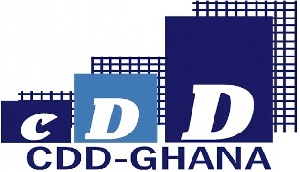The Ghana Center for Democratic Development (CDD-Ghana) on Thursday held a project evaluation and information sharing workshop on its Social Accountability and Citizens Participation in Local Governance programme.
The day’s workshop was held to review the performance and to mark the end of the Centre’s project: “Promoting Social Accountability through Citizens Participation in Local Governance”.
The three-year project, which covered 17 selected Metropolitan, Municipal and District Assemblies (MMDAs), was funded by the European Union (EU) at the cost of € 535,850, with CDD-Ghana contributing 10 per cent of the component.
The aim of the project was to build the capacities, increase knowledge on social accountability and sensitize citizens to take active part in the governance of their affairs.
The project which started in October 2011 to October, 2014, was given a six-month extension to April, 2015.
The project MMDAs in the various regions include, Bulsa North in Upper East; Wa West in Upper West; Tamale and Saboba in Northern; Kintampo North and Jaman North in Brong Ahafo; Sekyere Central, Obuasi and Bosome Freho in Ashanti.
The rest are Efutu and Ajuma Enyan Essiam in Central; Ahanta West in Western, Birim North and South in Eastern; Kadjebi in Volta; and Adenta and Accra Metropolitan Assemblies in Greater Accra.
Mr Francis Tsegah, the CDD-Ghana Senior Fellow, in his address said, one of the principal pillars of the 1992 constitution is the principle of democratic governance and public accountability.
“Our decentralisation programme and consequential local governance arrangement are premised on this principle by affording every Ghanaian the opportunity to participate in making decisions that affect him or her”, he said.
He explained that Ghana’s decentralisation programme was designed accordingly to establish local institutions, build local capacity, and give voice to the marginalised in societies and efficient provision of services for all.
However, he said despite the elaborate constitutional, legal and policy interventions, sufficient attention has not been paid to the challenges of participation and representation at the local level, especially on issues of responsiveness and accountability.
As a result, there is lack of commitment and effective local leadership, he said, adding that, a worrying effect of this is the lack of an effective system of information flow, relating to resource availability, distribution and service delivery.
Mr Tsegah noted that available audit and survey reports had provided evidence of the rot in local assemblies.
He observed that the project baseline survey conducted in 2013 ahead of the project field activities indicated that seven out of every 10 people had not participated in meetings to discuss decision affecting local governance.
He said it was worse when more than 70 per cent of respondents also indicated that they did not know how the district assemblies fix their local rates and taxes, and additional 70 per cent also indicated that even though they are aware of the functions of the district assemblies, they feel the district assemblies do not perform their functions.
He said it was on the basis of the numerous challenges bordering on transparent and prudent management of public resources, and the need to increase citizens participation in the governance of affairs as well as to improve the oversight responsibilities on duty bearers that this project was designed.
He further lauded the EU for funding the project.
Mr Joseph Bogrebon Allan, EU Programmes Officer, observed that social accountability was dear to the heart of the Union.
He said with increase in government revenue over the years, there was the need for stakeholders such as civil society organisations to scale up the task of accountability from public office holders.
He noted that evaluating the performance of projects would enable stakeholders to celebrate their successes and learn from their shortcomings.
Nana Kwabena Aborampah Mensah, CDD-Ghana Programmes Officer urged the beneficiary MMDAs to ensure the sustainability of the project.
Politics of Friday, 24 April 2015
Source: GNA

















